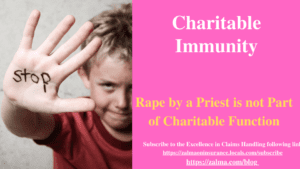Charitable Immunity

See the full video at https://rumble.com/v1emytg-charitable-immunity.html and at https://youtu.be/wZuYsRROLkA
The plaintiff sued the Roman Catholic Bishop of Springfield, a corporation sole (Roman Catholic Bishop of Springfield), and church officials for the sexual abuse by church leadership that he allegedly endured as a child in the 1960s and for the church’s handling of his complaint beginning in 2014.
In John Doe v. Roman Catholic Bishop Of Springfield & others, No. SJC-13219, Supreme Judicial Court of Massachusetts, Hampden (July 28, 2022) the defendants moved to dismiss the complaint on the grounds of common-law charitable immunity and the doctrine of church autonomy, the latter of which is derived largely from the religion clauses of the First Amendment to the United States Constitution. A Superior Court judge denied the motion.
ISSUES
The primary issue presented is whether the defendants may use the doctrine of present execution to appeal immediately from the denial of their motion to dismiss even though final judgment has not yet issued. The doctrine of present execution permits an appeal before final judgment when the appellate issue concerns a matter that is collateral to the underlying litigation and that cannot be addressed fully after final judgment.
The Massachusetts court concluded that common-law charitable immunity, as it existed before the Legislature abolished it in 1971, would be lost if a charity protected by the immunity nevertheless had to litigate.
BACKGROUND
In the 1960s, when the plaintiff was approximately nine to eleven years old, he served as an altar boy at a parish in Massachusetts. He was abused sexually by multiple church officials, including a priest at the parish, the pastor of the parish, and then Roman Catholic Bishop of Springfield Christopher J. Weldon. The abuse included “severe anal penetration” and occurred in a rectory bedroom at the parish, a camp in a different town, and a building adjacent to the parish. Weldon allegedly dragged the plaintiff into the room, where at least one other altar boy and two priests were present, and commanded one of the altar boys or priests to get the plaintiff onto the bed. The altar boys and priests grabbed the plaintiff, flipped him onto his stomach, and pinned him to the bed while Weldon and others “brutally raped” him.
After an investigation by the church, the Roman Catholic Bishop of Springfield at the time, defendant Mitchell T. Rozanski, wrote to the plaintiff in June 2020 stating that he accepted the former judge’s conclusion and asking the plaintiff to “accept [his] apology for the terrible abuse [the plaintiff] had to endure as a young child . . . [and] the chronic mishandling of [the plaintiff’s] report by the diocese time and time again since 2014.”
Unable to accept the apology, the plaintiff sued the Roman Catholic Bishop of Springfield and several church officials who had helped investigate the plaintiff’s allegations.
The defendants moved to dismiss counts one through seven for failure to state a claim on which relief can be granted, on the ground of common-law charitable immunity. They moved to dismiss counts eight through fourteen on the ground that resolving them would require the court to become entangled in a religious organization’s review process (namely, that of the diocesan review board) in violation of the religion clauses of the First Amendment.
DISCUSSION
The doctrine of present execution allows an appeal from otherwise nonfinal orders that
are “collateral to the rest of the controversy” and
“interfere[] with rights in a way that cannot be remedied on appeal from a final judgment,” because, for example, “protection from the burden of litigation and trial is precisely the right to which [a party] asserts an entitlement.” [Estate of Moulton v. Puopolo, 467 Mass. 478, 485 (2014), and Patel v. Martin, 481 Mass. 29, 33 (2018).]
An erroneous denial of immunity from suit cannot, by definition, be remedied after the party asserting the immunity already has litigated the matter to final judgment. And immunity from suit always is considered collateral to the underlying litigation.
Distinguishing between immunity from liability and immunity from suit, the court must look to the purpose behind the immunity rather than the words used to describe it.
Church Autonomy
The First Amendment prohibits civil courts from intervening in disputes concerning religious doctrine, discipline, faith, or internal organization. It permits hierarchical religious organizations to establish their own rules and regulations for internal discipline and government, and to create tribunals for adjudicating disputes over these matters.
The rule’s central purpose is to address the historic, philosophical concern with government interference in religious affairs by maintaining the constitutional separation between religion and government; at least originally, another purpose was to prevent civil courts from addressing matters in which they lack competence.
If the appellate court was to extend the doctrine of present execution to all important issues that theoretically cannot be remedied after final judgment, then the exception will swallow the rule. The defendants’ church autonomy arguments were not before the appellate court properly, and it refused to address their merits.
Common-Law Charitable Immunity
Common-law charitable immunity was abolished by the Legislature in 1971. Nonetheless, common-law charitable immunity applies to counts one through seven in this case because those counts describe conduct that allegedly occurred in the 1960s, and the abolishment of charitable immunity by the Legislature was prospective.
In protecting charities under the common law, Massachusetts courts reasoned that funds held in trust for a charitable purpose should be used only for that purpose.
Decisions sustaining the complete immunity view rationalize that the resources of charitable institutions are better used to further the institution’s charitable purposes than to pay tort claims lodged by the charity’s beneficiaries.
Unlike ecclesiastical abstention, then, the purpose of common-law charitable immunity was to protect certain parties from the burden of litigation and trial. Therefore, an interlocutory appeal is necessary to protect the rights of charities claiming common-law immunity, and the doctrine of present execution applies to the charitable immunity arguments here.
Merits Of Common-Law Charitable Immunity Argument
At common law, charitable immunity extended only to wrongdoing committed in the course of activities carried on to accomplish charitable activities. The abuse allegedly carried out by Weldon and other church leaders was not, and could not be, related in any way to a charitable mission. Accordingly, the judge properly denied the motion to dismiss on the ground of charitable immunity for the counts alleging sexual abuse of the plaintiff.
A negligent supervision claim is exactly the sort of allegation against which common-law charitable immunity was meant to protect. Therefore, count six should have been dismissed.
Reaching the merits, the court determined that common-law charitable immunity insulates the Roman Catholic Bishop of Springfield only from the count alleging negligent hiring and supervision. It does not protect the Roman Catholic Bishop of Springfield from the counts alleging sexual assault against the plaintiff, as these allegations do not involve conduct related to a charitable mission.
The order denying the defendants’ motion to dismiss was affirmed as to all counts except count six, on which judgment shall enter for the Roman Catholic Bishop of Springfield.
Regardless of the egregious abuse perpetrated on the Plaintiff the defendants properly asserted immunity for parts of the suit since they involved the charitable function of the Church while the rape of a young boy by high members of the church had absolutely nothing to do with its charitable function and provides an example why the state did away with the immunity.
Just published
Random Thoughts on Insurance Volume XIV: A Collection of Blog Posts from Zalma on Insurance —

(c) 2022 Barry Zalma & ClaimSchool, Inc.
Barry Zalma, Esq., CFE, now limits his practice to service as an insurance consultant specializing in insurance coverage, insurance claims handling, insurance bad faith and insurance fraud almost equally for insurers and policyholders. He practiced law in California for more than 44 years as an insurance coverage and claims handling lawyer and more than 54 years in the insurance business. He is available at http://www.zalma.com and zalma@zalma.com.
Subscribe and receive videos limited to subscribers of Excellence in Claims Handling at locals.com https://zalmaoninsurance.locals.com/subscribe.
Subscribe to Excellence in Claims Handling at https://barryzalma.substack.com/welcome.
Write to Mr. Zalma at zalma@zalma.com; http://www.zalma.com; http://zalma.com/blog; daily articles are published at https://zalma.substack.com. Go to the podcast Zalma On Insurance at https://anchor.fm/barry-zalma; Follow Mr. Zalma on Twitter at https://twitter.com/bzalma; Go to Barry Zalma videos at Rumble.com at https://rumble.com/c/c-262921; Go to Barry Zalma on YouTube- https://www.youtube.com/channel/UCysiZklEtxZsSF9DfC0Expg; Go to the Insurance Claims Library – https://zalma.com/blog/insurance-claims-library/
Like this:
Loading…
Related







